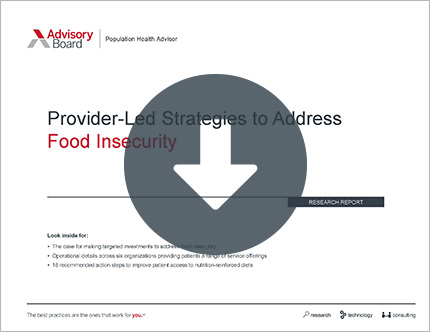Auto logout in seconds.
Continue LogoutAmericans under stay-at-home orders gained about 1.5 pounds every month, regardless of their location or comorbidities, according to a small study published in JAMA Network Open.
Improve patient access to nutrition-reinforced diets
Study details
For the study, researchers looked at data on 269 participants—located across 37 states and the District of Columbia—involved in the ongoing Health eHeart cardiology study. Participants agreed to regularly weigh themselves on Bluetooth-connected FitBit or iHealth smart scales and allowed the resulting data to be shared with the researchers.
The population was not nationally representative—about 77% of the participants were white while 3.5% were Black or African American, and about 3% were Asian-American. The average age for study participants was 51, and the group was fairly evenly split between men and women.
In total, the researchers gathered 7,444 weight measurements between Feb. 1, 2020, and June 1, 2020, to assess weight patterns before and after shelter-in-place orders and other restrictions took effect, averaging about 28 weight measurements from each study participant.
Overall, the researchers noted that while the participants had generally been losing weight before restrictions were put in place, their weight increased at a steady rate once those restrictions took effect. Specifically, the researchers found that, regardless of location or comorbidities, the participants gained 0.27 kilograms every 10 days, which the researchers said translates to about 1.5 pounds of weight gain each month.
Discussion
According to the researchers, the weight gain was "likely reflective of changes in physical activity and patterns of daily living, as well as concurrent self-reported increases in snacking and overeating." They noted that the findings "demonstrate a need to identify concurrent strategies to mitigate weight gain, such as encouraging healthy diets and exploring ways to enhance physical activity, as local governments consider new constraints in response to SARS-CoV-2 and potential future pandemics."
One of the researchers, Gregory Marcus, a cardiologist and professor of medicine at the University of California-San Francisco, echoed those conclusions. He noted that while the study "wasn't equipped to determine the specific reasons why individuals experienced weight gain during shelter-in-place," it's very "reasonable to assume much of it was related to lack of physical activity plus possibly more constant accessibility to food while working from home."
Leanne Redman, a professor of clinical physiology at the Pennington Biomedical Research Center at Louisiana State University, who wasn't involved in the study, agreed that physical activity likely decreased as shelter-in-place orders were implemented. "If you think about people commuting, even running to the subway or bus stop, or stepping in at the post office to mail a letter, or stopping at the store—we burn a lot of calories in non-exercise activities of daily living," she said.
Marcus also noted that since many of the study participants were losing weight before the orders took effect, "[i]t's reasonable to assume these individuals are more engaged with their health in general, and more disciplined and on top of things." He said, "That suggests we could be underestimating—that this is the tip of the iceberg."
Given that working remotely will "become a new norm" even after the pandemic subsides, Marcus offered some recommendations on how to stave off weight gain while at home. For instance, he said he encourages his patients "to consider how to incorporate physical activity into their daily routine in hopes of forming a habit, rather than viewing it as some special arduous event—ideally it's woven into the day like brushing your teeth. It can help to think about actually blocking out time on your calendar and treating that time to exercise like an appointment you can't miss."
Separately, Lauri Wright, director of the clinical nutrition program at the University of North Florida, who was not involved in the study, added that people can avoid eating excessively by assessing the roots of their hunger.
"Try to get in touch with your internal cues; are you really hungry or are you eating out of boredom or stress?" she said. "If it is stress, try some meditation or breathing exercises before you eat that donut. If it is boredom, FaceTime a friend or find a new hobby" (Bowden, The Hill, 3/22; Rabin, New York Times, 3/23; Minerd, MedPage Today, 3/22).

Explore best practice models for implementing programs to address food insecurity, learn from seven provider organizations that represent a broad range of food insecurity interventions, and get action steps for improving patient access to nutrition-reinforced diets.
Don't miss out on the latest Advisory Board insights
Create your free account to access 1 resource, including the latest research and webinars.
Want access without creating an account?
You have 1 free members-only resource remaining this month.
1 free members-only resources remaining
1 free members-only resources remaining
You've reached your limit of free insights
Become a member to access all of Advisory Board's resources, events, and experts
Never miss out on the latest innovative health care content tailored to you.
Benefits include:
You've reached your limit of free insights
Become a member to access all of Advisory Board's resources, events, and experts
Never miss out on the latest innovative health care content tailored to you.
Benefits include:
This content is available through your Curated Research partnership with Advisory Board. Click on ‘view this resource’ to read the full piece
Email ask@advisory.com to learn more
Click on ‘Become a Member’ to learn about the benefits of a Full-Access partnership with Advisory Board
Never miss out on the latest innovative health care content tailored to you.
Benefits Include:
This is for members only. Learn more.
Click on ‘Become a Member’ to learn about the benefits of a Full-Access partnership with Advisory Board
Never miss out on the latest innovative health care content tailored to you.
